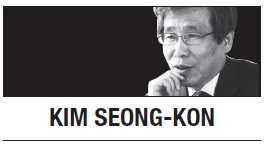[Kim Seong-kon] Is Orwell’s Big Brother still among us?
By Korea HeraldPublished : Jan. 17, 2017 - 17:27
 When George Orwell wrote his dystopian novel “1984,” he was disillusioned by the Cold War, which he perceived as a devastating phenomenon of a society under constant surveillance.
When George Orwell wrote his dystopian novel “1984,” he was disillusioned by the Cold War, which he perceived as a devastating phenomenon of a society under constant surveillance. In such a society, he was worried that people were being watched and monitored constantly by a totalitarian government that controlled and manipulated them.
In “1984,” there are posters everywhere with the phrase, “Big Brother is watching you,” and people are constantly watched 24/7. If you behave suspiciously, the thought police will immediately barge into your house and arrest you for sedition. Then you will be tortured and brainwashed.
Orwell’s world is divided into three regions: Oceania, Eurasia and Eastasia, controlled by the United States, the Soviet Union and a strong East Asian country respectively. The protagonist, Winston Smith resides in Oceania, formerly the UK which is incorporated into the States, and works for the government in the Department of Knowledge. His job is to alter and distort historical facts to suit the propaganda of the current regime.
In 1984, people said Orwell’s prediction was wrong. They boasted, “Unlike the world Orwell depicted in ‘1984,’ we now live in a free world, don’t we?”
Au contraire, Koreans were still living in an Orwellian society at that time. In 1984, for example, I knew there was a plainclothesman in my class at Seoul National University, closely monitoring what I lectured. I knew the authorities censored my newspaper columns. And I knew either the Korean police or the Korean CIA tapped my office phone when I was director of the American Studies Institute.
Thirty-three years have passed since 1984. However, Orwell’s prediction has turned out to be accurate in many aspects. For example, the world seems to be divided into three regions: Trump’s America and the post-Brexit UK can be seen as Orwell’s Oceania, the EU as Eurasia, and China as Eastasia.
Another example is the question we often have: Are we really living in a surveillance-free and censorship-free country? Whenever I write a newspaper column in Korean newspapers, I have to be conscious of possible vicious criticism and am forced to take precautions not to provoke those who do not tolerate different opinions. That means I need to censor my own writing before it goes public. An American columnist recently wrote that if you have to take precautions while writing a column, it means you are not living in a democratic society.
A few days ago, a high school student posted on the internet a different opinion on the current situation of Korea that led to the candlelight vigils. Immediately, he was bombarded by a mob of angry people who figuratively lynched not only him but also his mother who, according to them, was guilty of raising a national traitor. However, as the theory of entropy teaches us, uniformity brings forth the total annihilation of a system.
Recently, I was asked to write an essay in Korean. In my essay, I wrote, “Our youngsters complain that they now live in a tough world under tyranny and blame their parents for not bequeathing them a silver spoon.” I continued, “Do not blame your parents. Your parents and grandparents endured tougher times during the Korean War and under military regimes. And they have tried so hard to make a better nation for you.” Then I concluded, “Do you call this a tough world? Do you call this tyranny? You would not have said that if you had known what kind of ordeals your parents had to go through in the past.”
The editor immediately called me and gave me friendly advice, “With all due respect, sir, readers won’t tolerate some lines you wrote. For safety’s sake, we need to delete them, if you permit us.”
“I don’t understand,” I complained. “What’s wrong with the passage?” “Well, they may think you are supporting the tyrannical Park administration.” I protested, “If this were a tyrannical society, do you think any number of candlelight protests could force the president to face an impeachment trial? Do you have any idea what it was like to live in Korea during the 1970s and 1980s?”
The editor was still worried, “I understand what you mean. But there are still those who would attack you.”
“All right, go ahead and delete it,” I said, giving up. It occurred to me that George Orwell’s Big Brother was still among us, watching us.
Each episode of the TV show “Person of Interest” begins with the narration “You are being watched.” Then the screen shows numerous CCTV cameras in buildings and in the streets. When I meet or call someone these days, I am suspicious about whether he is recording our conversation on his smartphone. When I text or use KakaoTalk, I feel anxious about whether someone is monitoring my messages. If invisible censorship or surveillance still exists and if you feel you are being watched, George Orwell’s prophecy in “1984” is still valid. I hope Big Brother is no longer among us.
By Kim Seong-kon
Kim Seong-kon is a professor emeritus of English at Seoul National University and president of the Literature Translation Institute of Korea. He can be reached at sukim@snu.ac.kr. -- Ed.
-
Articles by Korea Herald


![[Exclusive] Korean military set to ban iPhones over 'security' concerns](http://res.heraldm.com/phpwas/restmb_idxmake.php?idx=644&simg=/content/image/2024/04/23/20240423050599_0.jpg&u=20240423183955)




![[Herald Interview] 'Amid aging population, Korea to invite more young professionals from overseas'](http://res.heraldm.com/phpwas/restmb_idxmake.php?idx=644&simg=/content/image/2024/04/24/20240424050844_0.jpg&u=20240424200058)
![[Pressure points] Leggings in public: Fashion statement or social faux pas?](http://res.heraldm.com/phpwas/restmb_idxmake.php?idx=644&simg=/content/image/2024/04/23/20240423050669_0.jpg&u=)










